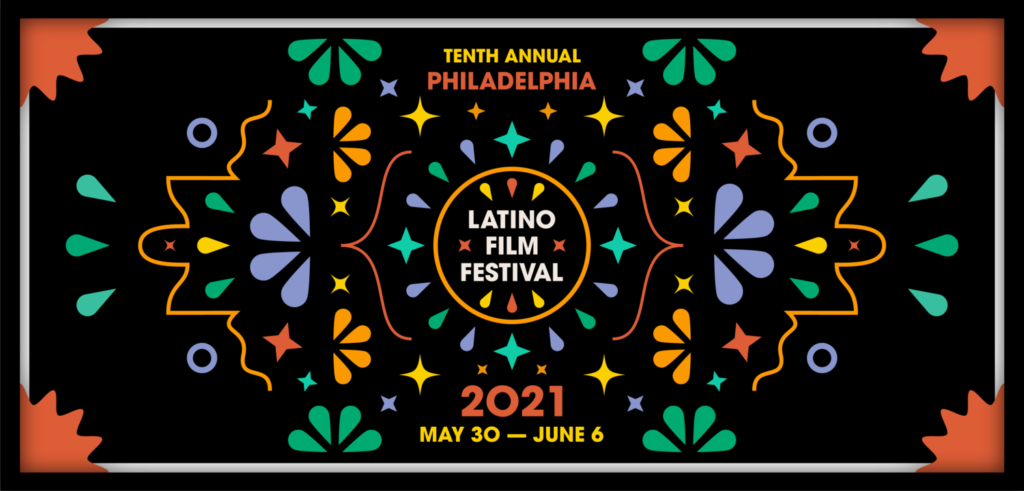 The Philadelphia Latino Film Festival (PHLAFF) returns for its 10th annual edition, May 30 to June 6, 2021. The festival aims to highlight the rich and complex realities of the Latino experience, intersecting identities, and stories from underrepresented communities. This year’s programming focuses on celebrating and telling the stories of women.
The Philadelphia Latino Film Festival (PHLAFF) returns for its 10th annual edition, May 30 to June 6, 2021. The festival aims to highlight the rich and complex realities of the Latino experience, intersecting identities, and stories from underrepresented communities. This year’s programming focuses on celebrating and telling the stories of women.
A decade after its founding, PHLAFF has expanded to include over 150 films as part of its lineup. Among them are twenty-six world premieres,eleven U.S. premieres, twenty-seven East Coast premieres, and fifty-nine Philadelphia premieres. Over the course of eight days (increased from four last year), there will also be a series of Q&A Greenroom Sessions, Work-in-Progress Lab, Youth Salon, and other unique filmmaker offerings for audiences to engage in. Audiences can tune in from across the globe through the streaming platform Eventive, available on virtually all devices.
This year’s festival highlights include:
-
Rita Moreno: Just A Girl Who Decided to Go For It, a documentary about the trailblazer in Latina representation who defied both her humble upbringing and relentless racism to become one of the most celebrated actresses of our times and EGOT-winning star.
-
La Madrina: The (Savage) Life of Lorine Padilla, a documentary about the beloved South Bronx matriarch and former “First Lady” of the Savage Skulls gang in 1970s New York City, capturing five decades of Bronx history and resilience in La Madrina’s own words.
-
Nuevo Rico, a short musical animated film by Kristian Mercado Figueroa about a brother and sister who stumble upon a celestial secret that changes their lives forever and propels them into reggaeton stardom, but soon discover that their newfound fame comes at a high price.
The world premieres of:
-
Calle de la Resistencia, an experimental film shot in Puerto Rico over three days during the pandemic, that blends real-life footage and staged musical production, and takes an emotional look at the struggle of boricuas to regain their dignity after hurricane Maria.
-
La Voz de Lupe (The Voice of Lupe), a documentary about Chicano muralists in California who have been community storytellers for over 60 years, that addresses racism and violence against women.
-
Rios de Ceniza (Rivers of Ash), an Argentinian/Colombian feature film about a man who jumps off a bridge to end his life and is transported to a dream universe where he embarks on a purgatory journey in which he faces his past and his insecurities.
The international premieres of:
-
La Casa de Mama Icha (The House of Mama Icha), a documentary about a 93-year-old immigrant who has lived in Philadelphia for decades, and heroically returns to Colombia to the house that she built during years of absence with the money she sent from abroad.
-
Laberinto (Labyrinth), an Uruguayan short film about a man with OCD who starts confusing obsessions for reality after his wife tells him of a dream in which she is sexually asphyxiated by another man.
-
Papi, a surreal feature film about a precocious 8-year-old girl with a vibrant imagination, whose flashbacks shed light on her relationship with her father, the elusive “Papi.” Based on the novel of the same title by Dominican writer and singer-songwriter Rita Indiana.
The U.S. premieres of:
-
Niña Mama (Mother-Child), a documentary shot in the intimacy of an Argentine public health clinic, about pregnant teenagers who have been subject to violence, misogyny, and repression, and have to decide whether or not to proceed with their pregnancy.
-
Matar a Pinochet (Kill Pinochet), a feature film about a group of young men and women who, in the spring of 1986, had in their hands the opportunity to change the destiny of Chile: to end the Pinochet dictatorship.
The East Coast premiere of:
-
Fruits of Labor, a documentary about a high school senior and second-generation Mexican American in an agricultural town in California, who must divide her time between school and supporting her undocumented family by working in the strawberry fields.
-
El Murmullo de la Marimba (The Whisper of the Marimba), a documentary about the musical instrument that connects the present-day life on the Ecuadorian coast with its African roots, and tells the story of the centuries-old musical resistance of this Afro-Latino community.
Individual screenings start at $10, film bundles at $20, weekend passes are $100, and festival passes $250. For full schedule, tickets & passes, visit phlaff.org.
